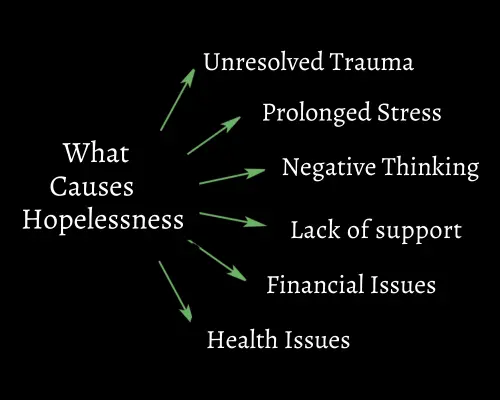Hopelessness is like a dark cloud hovering over us, casting a shadow on every aspect of our lives and dimming the light of possibility and potential. Whether from personal setbacks, societal challenges, or global crises, the feeling of hopelessness can leave us paralyzed and drained of motivation. Overcoming hopelessness may seem impossible sometimes, but carving out a future filled with meaning, purpose, and fulfilment is essential.
“Hope is being able to see that there is light despite all of the darkness.”
What causes feelings of hopelessness?
Feelings of hopelessness can be caused by a variety of factors, including:

Prolonged stress
Continuously dealing with high levels of stress can deplete mental and emotional resources, making it challenging to remain optimistic about the future. The constant pressure and strain can lead to fatigue and hopelessness as individuals struggle to see a way out of their circumstances or envision a brighter tomorrow.
Trauma
Experiencing significant trauma, such as abuse, violence, or a major life-threatening event, can profoundly impact one’s sense of hope. Trauma can shatter a person’s beliefs about the world being safe and predictable, leaving them feeling vulnerable, disillusioned, and uncertain about the future.
Chronic illness
Living with a long-term or chronic illness can be emotionally and mentally draining, significantly if it limits one’s ability to live a fulfilling life or achieve one’s goals. The constant management of symptoms, doctor visits, and lifestyle adjustments can wear down a person’s resilience, leading to feelings of hopelessness about their health and future.
Mental health issues
Conditions like depression, anxiety, or bipolar disorder can distort a person’s thoughts and emotions, making it challenging to maintain a positive outlook. Negative thought patterns, feelings of worthlessness, and a sense of emptiness can all contribute to a pervasive sense of hopelessness that colors how a person perceives their life and future possibilities.
Feeling overwhelmed
When faced with overwhelming stressors or responsibilities, individuals may feel powerless to change their circumstances or improve things. The sheer magnitude of their problems can make it difficult to see a way forward, leading to feelings of hopelessness and despair.
Lack of support
Not having a strong support system can exacerbate hopelessness, as individuals may feel alone in their struggles. Without friends, family, or community resources to turn to for help and encouragement, it can be challenging to maintain hope for a better future.
Financial problems
Struggling with financial difficulties, such as debt, unemployment, or poverty, can create a sense of hopelessness about one’s prospects. The constant stress of making ends meet and providing for oneself or family can overshadow any sense of optimism or hope for improvement.
Impact of Hopelessness on Mental Health
Hopelessness can have profound effects on mental health, influencing thoughts, emotions, and behaviors. Here are some common impacts:
- Depression: Prolonged feelings of hopelessness can lead to depression. This may include symptoms such as persistent sadness, loss of interest in activities, changes in appetite or sleep patterns, and feelings of worthlessness or guilt.
- Anxiety: Hopelessness is often accompanied by anxiety, including symptoms such as restlessness, irritability, difficulty concentrating, and muscle tension.
- Suicidal Ideation: In severe cases, prolonged hopelessness can lead to thoughts of suicide or self-harm. It’s essential to seek help if you or someone you know is experiencing these thoughts.
- Decreased Motivation: Feeling hopeless can sap motivation and make engaging in activities or pursuing goals difficult.
- Physical Health Effects: Chronic hopelessness can contribute to physical health problems, such as headaches, digestive issues, and sleep disturbances.
- Social Withdrawal: Feeling hopeless may lead to isolation and withdrawal from social interactions, which can further impact mental health.
Reframe Hopeless Thoughts
When you notice yourself feeling hopeless, take a moment to pause and acknowledge your thoughts without judgment. Recognize that these thoughts are not facts but interpretations influenced by your emotions. Next, challenge these thoughts by asking yourself if there is another way to view the situation.
Consider whether there is evidence to support your hopeless thoughts or if you might be overlooking other possibilities. For example, if you’re feeling hopeless about finding a job, remind yourself of past successes or positive feedback you’ve received. This can help you see that your current situation is not permanent and that there are reasons to remain hopeful.
Practice self-compassion by treating yourself with kindness and understanding. Remind yourself that it’s normal to feel hopeless and that your current circumstances do not determine your worth. Use positive affirmations to counteract negative self-talk and reinforce a more hopeful outlook. Focus on solutions rather than dwelling on problems. Break down daunting tasks into smaller, more manageable steps and take action where you can. Celebrate small victories along the way to boost your confidence and motivation.
Seek support from friends, family, or a mental health professional. Talking to someone you trust can provide new perspectives and help you feel less alone in your struggles. Remember, it’s okay to ask for help when you need it. Practice gratitude by reflecting on the things you’re grateful for in your life. This can help shift your focus from what’s lacking to what you have, fostering a sense of hope and positivity.
